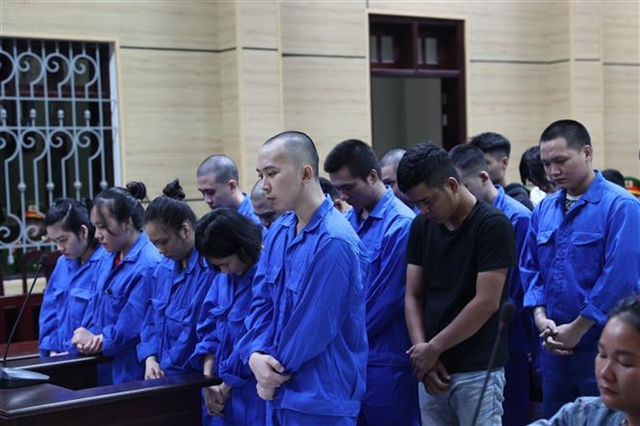▌Câu trả lời hay nhất
Thebest xbox casino games defendants are required to pay compensation of over VNĐ5.2 billion to 19 victims who were defrauded by the group.
 |
| The defendants at the People's Court of Tây Ninh Province. — VNA/VNS Photo |
TÂY NINH — The People's Court of Tây Ninh Province has sentenced 38 defendants involved in an online fraud ring to prison terms ranging from three years on probation to 12 years in prison, after a four-day trial.
Three defendants, including Nguyễn Hoàng Sang, residing in Châu Thành District, Tây Ninh Province, Lê Trường Thịnh, residing in Bến Cầu District in Tây Ninh Province and Phan Trung, residing in Hải Châu District in Đà Nẵng City have been sentenced to 12 years in prison.
Thirty-three defendants received sentences ranging from three to nine years in prison, while two defendants were sentenced to three years on probation.
The defendants are required to pay over VNĐ5.2 billion (US$209,000) in compensation to 19 victims of the fraud.
According to the indictment, from March to October 2022, Sang and his accomplices worked in Cambodia for a front company run by three unknown Chinese individuals, headquartered at Building B7, Venus Area in Svay Rieng Province.
From October 2022 to January 2023, the company moved its headquarters to Building H, King Crow Area, also in Cambodia. The defendants' role was to use the internet to defraud Vietnamese citizens via several methods.
The Chinese operatives posted job advertisements online, offering high salaries or asking employees to recruit friends and relatives to work in Cambodia. They also had employees sign six-month contracts with salaries of $800-$900 per month, increasing by $50 each subsequent month and earning commissions based on the total amount of money defrauded from victims.
Employees lived and worked together in the same building and were trained using materials, scripts and fraudulent dialogues. New employees learned from more experienced ones by observing their work and Chinese managers organised them into teams to carry out the frauds together.
From March to July 2022, sales staff worked independently, managing computers and phones to communicate with victims through calls or messages on platforms such as Zalo, Facebook and Telegram. They persuaded victims to create accounts on fake Shopee or Lazada sites to place orders. The staff guided victims to make purchases of fake orders to earn a commission of 10-15 per cent of the total amount of each order and provided the company's bank account details for victims to transfer the money.
For initial small amounts, victims were fully refunded, including both the principal and interest, to their bank accounts. Once trust was established, the perpetrators would ask victims to transfer additional funds to place larger fake orders, promising higher commissions.
When victims requested withdrawals, the sales and back-end staff would come up with excuses for why they could not get their money back, such as system errors or incorrect bank account details. They would insist on more funds, threatening to forfeit the already transferred money and interest.
Many victims transferred additional money to complete the tasks assigned by the perpetrators. When they could no longer transfer money, the defendants blocked all communication, deleted contacts, and stole the funds.
From July to December 2022, the Chinese operatives divided the staff into teams, each consisting of three people. Each team member managed one computer and one phone to deceive victims. The method involved sending enticing messages to lure victims into participating in tasks such as following TikTok accounts, liking posts or listening to MP3 music for payments ranging from VNĐ10,000 to 50,000 per task. Alternatively, victims were asked to place bets on games of chance to earn commissions of 30-60 per cent of the total betting amount.
Initially, victims transferred small amounts for the bets and were returned the principal, plus interest, into their bank accounts. However, victims were asked to submit more money for account verification when they transferred larger sums and requested withdrawals. If victims could no longer provide additional funds, their accounts on the Corona website were blocked and the perpetrators stole the money.
The total amount these defendants fraudulently acquired was over VNĐ5.2 billion from 19 victims. – VNS












